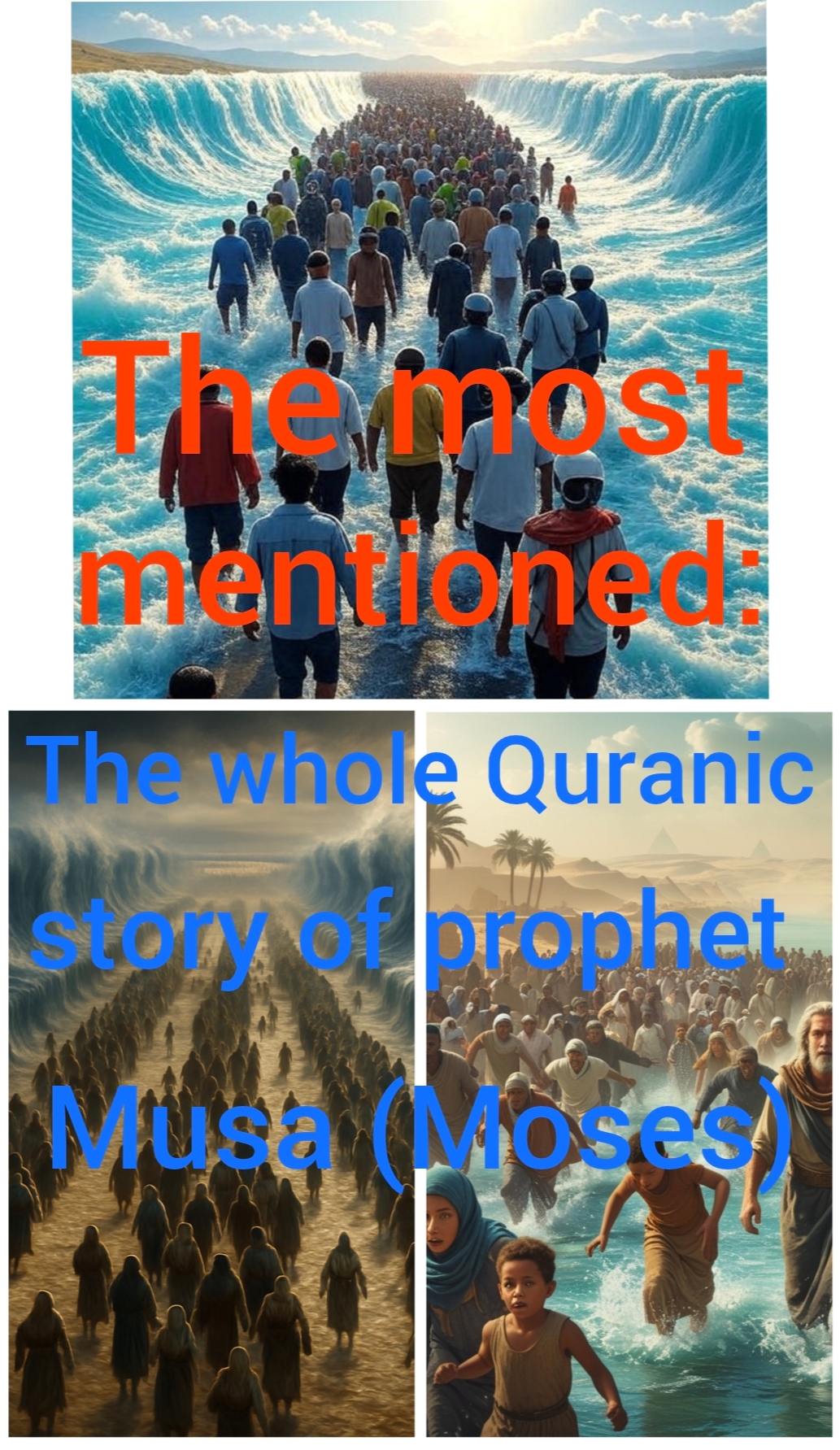Hub For Your Daily Islamic Insights 🕋 🕌

The Whole Quranic Story of Prophet Musa (Moses), The most mentioned prophet in the Quran
The most mentioned prophet in the Quran
$15.00
Experience the inspiring journey of Prophet Musa (Moses) like never before with this beautifully crafted visual guide. Showcasing the complete Quranic story, from his miraculous parting of the sea to the trials and triumphs with his followers, each scene is vividly illustrated to captivate both young and adult audiences. Ideal for classrooms, Islamic studies, or as a meaningful gift, this artwork brings spiritual lessons to life and sparks engaging discussion. Available in vibrant full color, standard poster size (24x36 inches), and printed on premium-quality, durable paper. Bring home this educational and motivational masterpiece today!
The story of Prophet Musa (Moses) is one of the most prominent and detailed narratives in the Quran, reflecting profound themes of faith, liberation, justice, and divine guidance. Throughout the Quran, Musa is mentioned more than any other prophet, underscoring his significance in Islamic teachings. Musa's story begins before his birth, during a turbulent time for the Children of Israel, who were living under the oppressive rule of Pharaoh in Egypt. Pharaoh, fearing that the Israelites would become too powerful, ordered the slaughter of all newborn Israelite males. It was in this climate of fear and oppression that Musa was born. To protect him, his mother placed him in a chest and set it afloat on the Nile River. By divine wisdom, the chest was found by Pharaoh's wife, Asiya, who was captivated by the infant and persuaded her husband to adopt him as their son. This act of mercy became a crucial part of Allah's plan for Musa, as he was raised in the royal palace, enjoying the privileges of royalty while being, unbeknownst to Pharaoh, a part of the oppressed group. As Musa grew up, he became aware of his identity as an Israelite and the suffering of his people. One day, witnessing an Egyptian beating an Israelite, he intervened, resulting in the death of the Egyptian. Fearing for his life, Musa fled Egypt and settled in Midian, where he married the daughter of a righteous man named Shu’ayb. During his time in Midian, Allah appointed Musa as a prophet, calling him from within a burning bush, commanding him to return to Egypt and lead the Children of Israel to freedom. Musa’s return to Egypt marked the beginning of his mission. Armed with divine instructions, he confronted Pharaoh, demanding the release of the Israelites. This confrontation was not merely a quest for liberation; it was also a challenge to the tyrannical authority of Pharaoh, who claimed divinity and refused to relinquish power. Allah provided Musa with signs and miracles to prove his prophethood, including turning his staff into a serpent and causing his hand to shine brightly. Despite the miraculous signs, Pharaoh and his court rejected Musa’s message, mocking him and increasing the suffering of the Israelites. Allah then sent a series of plagues upon Egypt as signs, intensifying Pharaoh's resistance. The plagues included floods, locusts, and darkness, each devastating but still met with Pharaoh's obstinacy. Ultimately, Allah sent the last of the signs, the killing of the firstborn sons of the Egyptians, which culminated in Pharaoh conceding to let the Israelites go. The departure from Egypt was a moment of liberation filled with urgency, as Musa led the Israelites out of slavery. However, Pharaoh, regretting his decision, pursued them with his army. The climax of Musa’s story is marked by the miraculous parting of the Red Sea, where Allah commanded Musa to strike the sea with his staff, allowing the Israelites to cross on dry land. When Pharaoh and his army attempted to follow, the waters returned, engulfing them. After their escape, the Israelites witnessed numerous miracles but also struggled with their faith and trust in Allah. They complained about the lack of food and water, leading Allah to provide them with sustenance, like manna and quails. At Mount Sinai, Allah revealed to Musa the Torah, giving him the laws to guide and govern the behavior of the Children of Israel. However, during Musa’s absence on the mountain, some Israelites succumbed to temptation and worshiped a golden calf, a betrayal of their covenant with Allah. Upon his return, Musa was filled with anger and disappointment, which led to a dire consequence for those who had strayed from the path of faith. He interceded for his people, seeking Allah's mercy for their transgressions, showcasing his role as a prophet and leader. Musa’s journey with the Israelites continued as they wandered in the desert for years. The trials they faced were numerous, but through persistence and faith in Allah, he led them closer to the Promised Land. Musa’s story is not only a tale of personal struggle and divine interaction; it encompasses themes of perseverance, communal responsibility, and moral integrity. Eventually, Musa guided the Israelites to the borders of the Promised Land. However, due to the sins of the people and their persistent questioning of Allah’s plan, Musa was not permitted to enter it himself. He passed away before reaching their destination, leaving a legacy of faith, leadership, and unwavering trust in Allah. Prophet Musa’s story serves as a profound reminder of the importance of faith in overcoming adversity, the significance of divine guidance, and the need for ethical and moral conduct. His life exemplifies a relentless pursuit of justice and liberation, resonating deeply with people seeking solace and direction in their own struggles.
